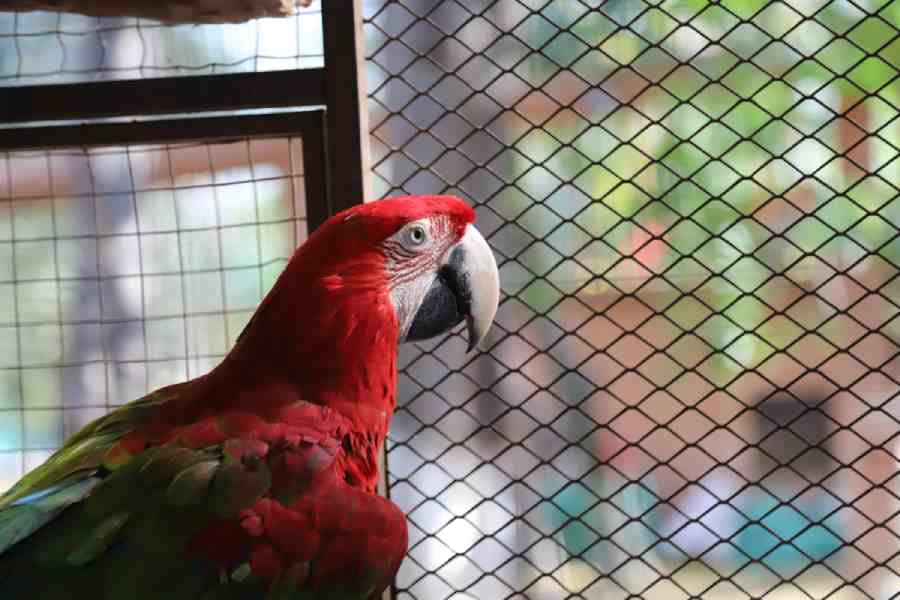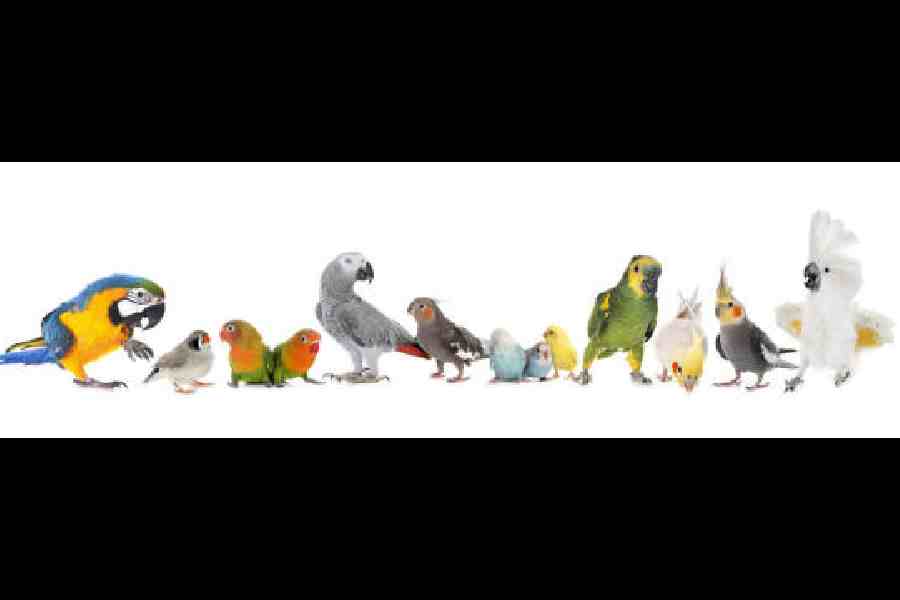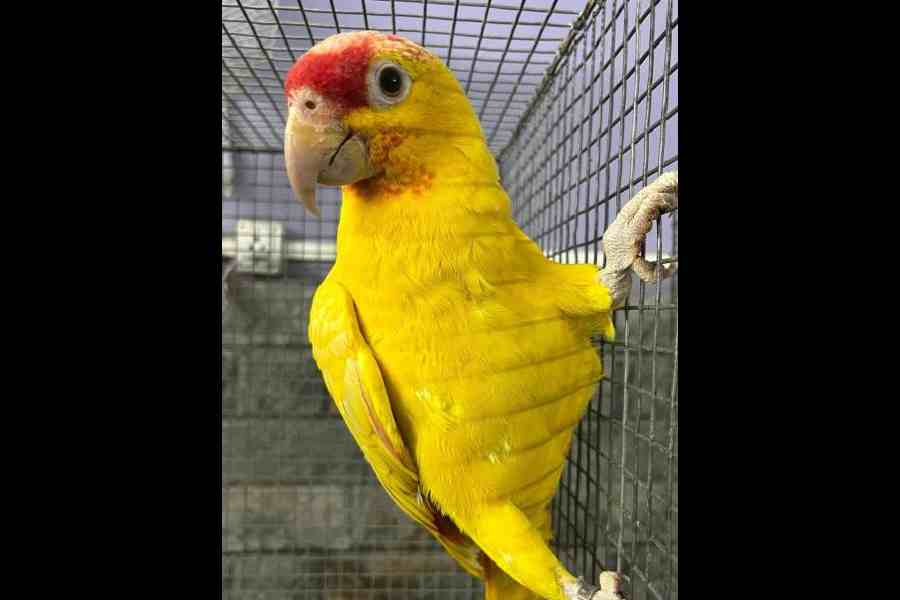A bird lover’s group recently held a camp to educate owners about the laws of keeping birds at home. In the recent past, multiple owners have been accused of smuggling birds, only to have the charges thrown out in court. The camp was specifically aimed at protecting owners from such harassment.
“In 2020, the ministry of environment, forest and climate change gave a one-year window for owners to declare their exotic birds. This was to be done on the Parivesh web portal. We now have to update sale, purchase, births and deaths there. But the site is confusing and we’ve got over a thousand enquiries from bird owners about them,” said Sukanta Mallick, secretary of Exotic Birds & Pets Awareness Welfare Association, the body that held the meet near Hatibagan.
“Aged pet owners aren’t Net-savvy and semi-literate traders at haats have no clue what a web portal is. But they all run the risk of getting raided by the authorities,” said Sukanta.

Close-up of scarlet macaw parrot in a cage
The group had flown down advocate R. Senthil Kumar from Madurai, Tamil Nadu, to simplify the laws for the audience. Kumar is an advocate with over 30 years of experience practising in all high courts and specialising in exotic species cases.
Register your bird
“Before the Parivesh portal in 2020, exotic birds were exempted from the Wildlife Protection Act. But the portal began by asking for voluntary disclosure of such birds within a year,” said Kumar. Anyone disclosing a bird in that window were not required to produce any source document like where, when and how it was acquired.
“Most importantly, owners were assured that the declared birds would never be implicated in any criminal case in perpetuity,” said Kumar. “The chief wildlife warden would then verify the declarations after home visits and issue a certificate of ownership within six months from the date of such declaration. To date, many verifications are pending but if the owner has done his bit, it is enough of a document, as confirmed by various high court judgments.”
The Wildlife Protection Amendment Act 2022 introduced the concept of breeder licence. “Anyone already breeding and seeking to breed CITES 1 birds needs to pay Rs 25,000 per application. In one application you can mention multiple birds,” said Kumar.
CITES is an abbreviation for the Convention on International Trade in Endangered Species of Wild Fauna and Flora. It is an international treaty to protect these birds and regulate their trade. It includes birds like Macaw, Grey Parrot and Cockatoo. Those breeding say, Zebra Finches, Budgerigars or Cockatiels do not need a licence.
But a new version of the portal — Parivesh 2.0 — was launched in 2023 which is confusing, controversial and which bird-loving associations want to challenge in court. Initial registration of birds must now be done in six months along with a fee of Rs 1,000 per application. Progeny must be registered within seven days now, as opposed to the previous 30, along with a Rs 1,000 fee. Sale, purchase etc must be registered in 15 days, instead of 30, along with another fee of Rs 1,000, informed Kumar. “The sucker punch is that all birds to be declared in Parivesh 2.0 will no longer have immunity from criminal prosecution, which they did before,” he said.
History of harrasment
Kumar cited case after case where despite complying with the above, bird owners were harassed, arrested and had their birds seized by the authorities on suspicion of smuggling.
“If forest officers have a doubt, they are vested with powers to visit your house and conduct a search without prior notice,” Kumar said. “Of late, most cases are based on false tips received by officials and it is the breeders who are facing endless battles in court to prove their innocence.”
Sukanta, the secretary of the group, recounted two cases when he was targeted by the authorities. “One of these cases has been quashed by the court and I’m now filing a defamation case of Rs 1 crore against the customs department,” he said.
Amitava Ghosh, a Lake Town resident, recalled how wildlife officers stormed his house in August, demanding to see his papers. “I had just bought several birds and was yet to update the purchases on the Parivesh portal. But I produced all bills. They still assaulted me, dragged me by the collar across the neighbourhood announcing that I was a smuggler,” said Ghosh.
“They seized 19 birds, including a rare Hyacinth Macaw that had lived like a family member in my house for 19 years. This bird was declared on the Parivesh portal and as per law should have been immune from criminal cases. But they still seized it, leaving my mother and grandfather in tears,” he recalled.
Ghosh was imprisoned for 10 days and produced in court along with his birds, which he says the authorities had confined in tiny, suffocating cages. “When released, I went to see the birds that had been kept in Harinalaya mini zoo of Eco Park. Out of the 19 seized birds, it seems only 17 were brought over. My Lutino Amazon pair, that I had bought for Rs 9.5 lakh, had been stolen,” said Ghosh, who is now fighting it out in court.
Not a crime
Priti Chatterjee Mallick, treasurer of the association, urged bird lovers to unite at a time when they were being targeted.
“There are also misconceptions about this hobby among the public,” she said. “A few months ago, an FM radio channel, on the pretext of being humane, was asking listeners to inform them about anyone who was caging Indian or foreign birds. We had to get a lawyer to speak to the channel and stop this ignorant announcement,” Priti said.

“If someone releases foreign birds into the wild, he will be charged under the Indian Forest Act and Forest Conservation Act,” said Kumar. “This is because the exotic species would encroach on the native birds’ food and space. If they happen to mate with local birds, their chicks would be hybrids, gradually eradicating Indian birds.”
Priti said the exotic bird industry involved some 70 lakh people in Bengal, including those who breed, make their grains, cages etc but they were now leaving the field for fear of harassment. “Particularly, many homemakers are involved in this trade. Birds are low-maintenance pets and the women simply have to feed them. In fact, in nature, the mother bird only feeds the strongest chicks, assuming the weak ones would perish anyway. But these women hand-feed the weaklings so they make it,” said Priti.
She spoke of how breeds like Sun Conure and Moluccan Cockatoo have become endangered in their native countries but are thriving in Indian homes. “The Spix’s Macaw was declared extinct in the wild in 2019 but is being reintroduced in jungles from conservation projects around the world. If government norms were simpler, India could export top-quality birds to the world too.”
